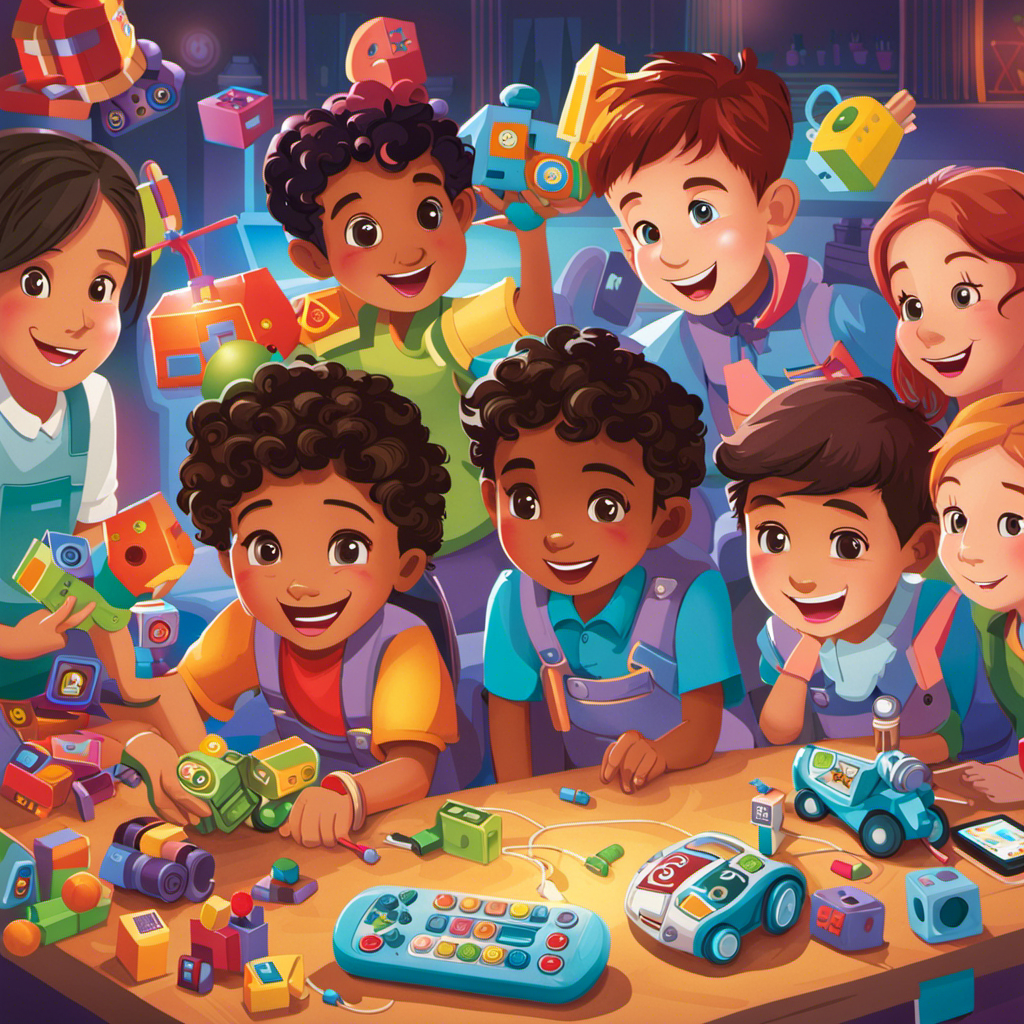As a child development specialist, I have observed that egocentrism is common among young children. Did you know that, according to Piaget’s theory, egocentrism typically emerges in children between the ages of two and seven?
It is fascinating to explore the characteristics of egocentric thinking and its impact on moral development. In this article, we will delve into the definition of egocentrism, its age range, and the long-term effects it may have.
Additionally, we will discuss strategies to support healthy development amidst egocentric tendencies.
Key Takeaways
- Egocentrism is a belief that one’s own perspective is the only valid one and is a key characteristic of the preoperational stage of cognitive development.
- Children in the egocentric stage struggle to understand that others may have different thoughts, feelings, and viewpoints, leading to a lack of empathy and difficulty in social interactions.
- Egocentrism hinders communication, understanding of social cues, and cooperative play, impacting social and emotional development.
- Overcoming egocentrism involves developing the ability to take others’ perspectives into consideration, which can be facilitated through modeling empathetic behavior, encouraging conversations that promote considering others’ perspectives, and engaging in perspective-taking exercises.
Definition of Egocentrism
Egocentrism is the belief that children have that their own perspective is the only valid one. According to Piaget’s stages of cognitive development, egocentrism is a key characteristic of the preoperational stage, which typically occurs between the ages of 2 and 7. During this stage, children struggle to understand that others may have different thoughts, feelings, and viewpoints than their own.
One example of egocentrism is the inability to take another person’s perspective. For instance, a child might believe that if they can see something, everyone else can see it too, or if they want something, everyone else must want it as well. This limited ability to understand different perspectives can lead to a lack of empathy and difficulty in social interactions.
Piaget’s theory of egocentrism suggests that children gradually develop the ability to understand others’ perspectives as they progress through the stages of cognitive development. This transition from egocentrism to more advanced social understanding is an important aspect of a child’s cognitive growth.
Understanding egocentrism and its role in child development provides valuable insights into how children perceive and interact with the world around them.
Piaget’s Theory of Egocentrism
In Piaget’s theory, children have difficulty understanding the perspectives of others. According to Piaget, cognitive development occurs in distinct stages, and egocentrism is a characteristic of the preoperational stage, typically occurring between the ages of 2 and 7. During this stage, children struggle to take on the viewpoint of others and tend to see the world solely from their own perspective. To better understand the concept of egocentrism, let’s take a look at the following table:
| Characteristic | Description | Example |
|---|---|---|
| Centration | Focusing on one aspect of a situation | Believing a taller glass holds more water |
| Lack of Conservation | Inability to understand quantity remains the same despite changes in appearance | Thinking there is more water in a taller glass |
| Animism | Assigning human-like qualities to inanimate objects | Believing a stuffed animal has feelings |
| Difficulty with Theory of Mind | Struggling to understand that others have thoughts, beliefs, and perspectives different from their own | Believing everyone sees the world the same way |
As children progress through Piaget’s stages of cognitive development, they gradually overcome egocentrism and develop a better understanding of others’ perspectives. This transition typically occurs around the age of 7, marking an important milestone in their social and emotional development.
Age Range for Egocentrism
Egocentrism in preschoolers refers to the tendency of young children to view the world solely from their own perspective. They often struggle to understand the viewpoints of others.
Overcoming egocentrism in children involves gradually developing the ability to take others’ perspectives into consideration and empathize with them.
This process is crucial for the development of social skills. Egocentrism can hinder children’s ability to communicate effectively, understand social cues, and engage in cooperative play.
Egocentrism in Preschoolers
Preschoolers tend to have difficulty understanding other people’s perspectives because of their stage of development known as egocentrism. Egocentrism refers to the belief that one’s own thoughts, feelings, and experiences are the same as everyone else’s.
In terms of problem solving, egocentrism can hinder preschoolers’ ability to consider alternative viewpoints or solutions. They may struggle to understand that others may have different thoughts or preferences.
Similarly, egocentrism can impact social interactions. Preschoolers may have a hard time understanding why someone else feels upset or why they have a different opinion. They may also struggle with sharing and taking turns, as they may not fully grasp the idea of sharing with others.
Overcoming egocentrism in children requires providing them with opportunities for perspective-taking, teaching empathy, and fostering social interactions that encourage understanding and cooperation.
Overcoming Egocentrism in Children
To overcome this tendency, you can encourage your child to consider other people’s perspectives and teach them the importance of empathy. By doing so, you are supporting healthy development and helping them overcome egocentrism.
Research has shown that children who are able to understand and empathize with others have better social skills and stronger relationships. One way to promote empathy is by engaging in conversations that encourage your child to see things from different viewpoints. You can also provide opportunities for them to practice empathy, such as volunteering or helping others in need.
By actively promoting empathy and perspective-taking, you are helping your child develop important skills that will benefit them throughout their lives.
This understanding of others’ perspectives is crucial for their social skills and interactions with peers. Egocentrism can hinder a child’s ability to effectively communicate and collaborate with others. It is important for children to learn that their own thoughts and feelings are not the only ones that matter.
Egocentrism and Social Skills
Understanding and considering others’ perspectives is essential for developing strong social skills and forming meaningful connections with peers. When it comes to egocentrism and social skills, there are several important points to consider:
-
Egocentrism can hinder the development of emotional intelligence. Children who are egocentric may struggle to understand and empathize with the feelings and perspectives of others, which can make it difficult for them to navigate social interactions effectively.
-
Egocentrism can impact peer relationships. When a child is primarily focused on their own needs and desires, it can lead to conflicts and misunderstandings with peers. Developing the ability to consider others’ perspectives is crucial for fostering positive and healthy relationships.
-
Overcoming egocentrism requires teaching and practice. Through guidance and opportunities for perspective-taking, children can learn to expand their understanding beyond their own point of view and develop more well-rounded social skills.
Transitioning to the next section, let’s explore the characteristics of egocentric thinking and how it manifests in child development.
Characteristics of Egocentric Thinking
You may notice that preschoolers often struggle with seeing things from other people’s perspectives. This is because they are in the stage of development known as egocentrism, where they have difficulty understanding that others have different thoughts, feelings, and viewpoints than their own. Egocentric thinking is characterized by a child’s inability to take on the perspective of others, resulting in a self-centered view of the world. This can manifest in egocentric behavior, such as not sharing toys or not considering the feelings of others.
During this stage, children tend to focus solely on their own needs and desires, without considering the needs and desires of others. For example, a child may grab a toy from another child without realizing that it may upset them. They may also have difficulty in understanding that others may see things differently or have different opinions. This egocentric thinking is a normal part of early childhood development and gradually diminishes as children grow older and develop more sophisticated cognitive abilities.
Transitioning into the subsequent section about ‘egocentrism vs. egocentric behavior,’ it is important to note that while egocentrism refers to the cognitive aspect of children’s thinking, egocentric behavior refers to the actions that result from this self-centered mindset.
Egocentrism Vs. Egocentric Behavior
During adolescence, egocentrism becomes more prominent as individuals navigate the complexities of their changing identities and social relationships. This egocentrism is characterized by a heightened self-consciousness and a belief that everyone is constantly observing and evaluating their behavior.
One of the key impacts of egocentrism in adolescence is on problem-solving skills. As teenagers become more focused on their own perspectives and emotions, they may struggle to consider alternative viewpoints or think critically about complex issues. This can hinder their ability to effectively analyze problems and develop creative solutions.
To engage the audience, here are four important points to consider regarding egocentrism in adolescence:
- Egocentrism can lead to a limited perspective, making it difficult for teenagers to see beyond their own thoughts and experiences.
- This self-centeredness can also result in difficulties in understanding the emotions and motivations of others.
- Egocentric thinking can hinder effective communication and collaboration with peers, as teenagers may struggle to consider different perspectives.
- Adolescents may also exhibit heightened self-consciousness and a preoccupation with their own appearance and social status.
Transitioning into the subsequent section about the impact of egocentrism on social development, it is important to understand how egocentrism can shape interpersonal relationships and influence social interactions.
Impact of Egocentrism on Social Development
When it comes to the impact of egocentrism on social development, there are several key points to consider.
First, egocentrism can hinder empathy development in children, as they struggle to understand and consider the feelings of others.
Second, egocentrism also affects perspective-taking, making it difficult for children to see things from another person’s point of view.
Lastly, it is important to discuss strategies for overcoming egocentrism in children, as it plays a crucial role in their social interactions and relationships.
Egocentrism and Empathy Development
As a child develops, they may struggle with understanding others’ perspectives, hindering the development of empathy. Egocentrism, a common characteristic in early childhood, plays a significant role in this process.
Egocentrism refers to children’s tendency to view the world solely from their own perspective, without considering the viewpoints of others. This limited perspective can hinder the development of empathy, as children may struggle to understand and relate to others’ emotions and experiences.
Research has shown that egocentrism negatively impacts emotional intelligence, which is crucial for understanding and regulating emotions in social interactions. Additionally, egocentric children may struggle to establish and maintain positive social relationships, as their focus remains predominantly on their own needs and desires.
However, as children develop, they gradually acquire the ability to take others’ perspectives into account, leading to the next section on egocentrism and perspective-taking.
Egocentrism and Perspective-Taking
In the previous section, we explored how egocentrism can impact the development of empathy in children. Now, let’s delve into another aspect of egocentrism: perspective-taking.
Egocentrism and theory of mind go hand in hand, as children with egocentric thinking struggle to understand that others have different thoughts, feelings, and perspectives than their own. This lack of perspective-taking ability is closely related to egocentrism and social cognition.
To help you visualize this concept, imagine a child who is unable to see beyond their own viewpoint. They may struggle with:
- Understanding that others have different thoughts and opinions
- Recognizing that someone else’s perspective may differ from their own
- Taking into account other people’s feelings and experiences
- Failing to consider how their actions may impact others
Understanding the link between egocentrism and perspective-taking is crucial in overcoming egocentric tendencies in children.
Overcoming Egocentrism in Children
To help your child overcome egocentrism, it is important to encourage empathy and teach them to consider others’ perspectives. By doing so, you can help your child develop a more compassionate and understanding mindset. Here are some strategies to help children overcome egocentrism:
-
Model empathetic behavior: Show your child what it means to be empathetic by demonstrating kindness, understanding, and compassion towards others.
-
Encourage perspective-taking: Engage your child in conversations that encourage them to consider how others might feel or think in different situations.
-
Teach problem-solving skills: Help your child understand that their needs and wants are not the only ones that matter, and teach them how to find solutions that take others’ perspectives into account.
-
Foster social interactions: Encourage your child to engage in social activities where they can interact with different individuals and learn from their experiences.
Transition: Understanding the strategies to help children overcome egocentrism is crucial for their cognitive development and navigating social interactions.
Cognitive Development and Egocentrism
Children’s cognitive development is characterized by egocentrism, where they struggle to see things from others’ perspectives. This egocentric thinking is a normal part of their development and can be observed in various aspects of their lives, including language development. Here are some key points to understand about the relationship between egocentrism and language development:
-
Limited perspective-taking: Egocentric children have difficulty understanding that others may have different thoughts, feelings, or beliefs than their own. This limited perspective-taking can affect their ability to communicate effectively with others.
-
Self-centered speech: Egocentric children often engage in self-centered speech, where they talk primarily about themselves and their own experiences. This type of speech reflects their difficulty in considering the perspectives and interests of others.
-
Difficulty in understanding figurative language: Egocentric thinking can also hinder their comprehension of figurative language, such as metaphors or idioms. They may interpret these expressions literally, leading to misunderstandings.
-
Challenges in turn-taking: Egocentric children may struggle with turn-taking during conversations, as they may monopolize the conversation or have difficulty listening to others’ contributions.
-
Limited empathy and social awareness: Due to their egocentric thinking, children may have limited empathy and social awareness, which can impact their ability to understand and respond to the emotions and needs of others.
Understanding the impact of egocentrism on language development is crucial for educators and parents, as it can guide interventions and strategies to support children in developing more effective communication skills.
Transitioning into the subsequent section about ‘egocentrism in language and communication,’ it becomes evident that egocentrism can have a significant influence on how children learn to interact and express themselves verbally.
Egocentrism in Language and Communication
When trying to communicate with others, it can be challenging for me to understand their perspectives and consider their interests due to my egocentric thinking. Egocentrism, a characteristic of child development, also influences language acquisition and communication skills.
During the early stages of language development, children tend to use language egocentrically, meaning they primarily focus on their own thoughts and experiences. This can be seen in their conversations, where they often talk about themselves and their own interests without considering the interests of others. As shown in the table below, this egocentric language use can hinder effective communication and understanding:
| Egocentric Language Use | Impact on Communication |
|---|---|
| Talking only about oneself | Others may feel ignored or unimportant |
| Not asking questions or showing interest in others | Lack of engagement and connection |
| Assuming others share the same knowledge and perspective | Misunderstandings and confusion |
To overcome this egocentric tendency and improve communication skills, children need to develop perspective-taking abilities. This will allow them to understand and consider the thoughts, feelings, and interests of others. In the subsequent section, we will explore how egocentrism and perspective taking are interconnected and how they develop in children.
Egocentrism and Perspective Taking
In my previous discussion about egocentrism in language and communication, I explored how children often struggle to consider the perspective of others when expressing themselves. This lack of perspective taking is closely related to a broader concept known as egocentrism in child development.
Egocentrism refers to the tendency for young children to view the world solely from their own perspective, without fully considering the viewpoints of others. This cognitive limitation is believed to stem from the immaturity of their theory of mind, which is the ability to understand that others may have different thoughts, beliefs, or perspectives.
As a result of egocentrism, children may have difficulty understanding social cues, interpreting others’ emotions, and engaging in effective social interactions. Their social cognition is hindered by their inability to fully grasp that others may have different thoughts, desires, or intentions.
Understanding the role of egocentrism in social cognition is crucial for supporting children’s social development. By recognizing and addressing their egocentric tendencies, we can help children develop better perspective-taking skills and enhance their ability to empathize with others.
Now, let’s explore some strategies to help children overcome egocentrism and develop more nuanced social cognition.
Strategies to Help Children Overcome Egocentrism
To help your child overcome egocentrism and develop more nuanced social cognition, there are several strategies you can try.
As a parent, one effective strategy is to engage in perspective-taking exercises with your child. Encourage them to consider how others might feel or think in different situations. This can be done through storytelling, role-playing, or discussing real-life scenarios. Additionally, modeling empathy and compassion in your own behavior can have a significant impact on your child’s development.
In the classroom, teachers can implement strategies that promote perspective-taking and empathy. For example, group activities that require collaboration and cooperation can help children understand different viewpoints and learn to work together effectively. Teachers can also incorporate literature or videos that highlight diverse perspectives and encourage discussions about them. By fostering an inclusive and accepting classroom environment, teachers can support children in overcoming egocentrism and developing a greater understanding of others.
Egocentrism and Moral Development
By understanding and considering the perspectives of others, parents and teachers can support children in developing a greater understanding of morality. Egocentrism, a concept in cognitive development, plays a crucial role in moral reasoning. During the early stages of childhood, children tend to be egocentric, meaning they have difficulty understanding that others have different perspectives, thoughts, and feelings. This egocentrism can impact their moral development as they struggle to consider the needs and feelings of others when making moral judgments.
To illustrate the relationship between egocentrism and moral development, consider the following table:
| Egocentrism | Moral Reasoning |
|---|---|
| Egocentrism limits understanding of others’ perspectives | Moral reasoning may be based solely on personal desires and needs |
| Difficulty empathizing with others | Less likely to consider the impact of actions on others |
| Gradually develop the ability to take others’ perspectives | Moral reasoning becomes more sophisticated and considers the well-being of others |
As children grow and develop, their egocentrism gradually diminishes, allowing them to consider the perspectives of others and make more nuanced moral judgments. This progress is essential for fostering empathy, compassion, and ethical decision-making.
Understanding the impact of egocentrism on moral development can guide parents and teachers in supporting children’s growth in this area. By providing opportunities for perspective-taking, engaging in discussions about moral dilemmas, and modeling empathetic behavior, adults can help children navigate egocentrism and develop a greater understanding of morality.
Transition into the subsequent section about ‘cultural influences on egocentrism’: Exploring the cultural influences on egocentrism further enhances our understanding of its development and impact on moral reasoning.
Cultural Influences on Egocentrism
Cultural influences shape how individuals perceive and understand the perspectives of others, impacting their moral reasoning. These influences play a crucial role in shaping our social development and how we interact with others. Research has shown that cultural values and norms greatly influence how individuals prioritize their own needs and desires over those of others, leading to egocentric thinking and behavior.
In collectivist cultures, such as those found in many Asian countries, the emphasis is on the needs of the group rather than individual desires. This cultural emphasis on collectivism can lead to less egocentric thinking, as individuals are taught from an early age to consider the perspectives and needs of others. On the other hand, in individualistic cultures, such as those found in Western societies, the focus is on individual autonomy and personal success. This emphasis on individualism can contribute to more egocentric thinking, as individuals are encouraged to prioritize their own needs and desires above others.
Understanding the impact of cultural influences on egocentrism is important because it helps us recognize that egocentric thinking is not solely a result of individual personality traits or developmental processes. Rather, it is a product of the cultural context in which we are raised. By recognizing and understanding these cultural influences, we can work towards promoting more empathetic and compassionate perspectives, ultimately leading to healthier social interactions and moral reasoning.
Transitioning into the subsequent section about the long-term effects of egocentrism, it is important to explore how egocentric thinking can shape our relationships and overall well-being.
Long-term Effects of Egocentrism
As I grow older, I’ve realized the consequences of being focused solely on my own needs and desires. This self-centered mindset can greatly impact my relationships and overall well-being. Research shows that people who are overly self-focused struggle to form meaningful connections with others. Their constant preoccupation with themselves leaves little room for considering the needs and perspectives of those around them, causing strain and damage to relationships. Additionally, being too self-centered can lead to feelings of loneliness and isolation as it becomes difficult to build a support network of friends and loved ones.
Not only does egocentrism affect relationships, but it also has long-term effects on our well-being. When we’re solely focused on ourselves, we may neglect important aspects of self-care, such as maintaining healthy habits and seeking support when needed. This neglect can result in physical and mental health issues over time.
In order to support healthy development in the face of egocentrism, it’s crucial to find a balance between our own needs and the needs of others.
Supporting Healthy Development in the Face of Egocentrism
Finding ways to support healthy growth and maturity in the midst of a self-centered mindset can be challenging, but it is crucial for fostering meaningful connections and overall well-being. As children develop, it is important to actively support their empathy development and promote perspective taking.
Here are three strategies that can help in this process:
-
Model empathy: Children learn by observing and imitating those around them. By consistently demonstrating empathy in our own actions and interactions, we provide a powerful example for them to follow. This includes actively listening, validating their feelings, and showing understanding.
-
Encourage perspective taking: Help children understand that different people may have different thoughts, feelings, and experiences. Encourage them to consider alternative perspectives by asking open-ended questions and engaging in discussions that explore different viewpoints.
-
Provide opportunities for empathy-building activities: Engage children in activities that require them to consider the feelings and needs of others. This can include volunteering, participating in community service projects, or even role-playing scenarios that require empathy and perspective taking.
Frequently Asked Questions
How Does Egocentrism Impact a Child’s Ability to Form Relationships With Others?
Egocentrism can have significant implications for a child’s emotional intelligence and social skills development. When children are egocentric, they struggle to understand and consider others’ perspectives, making it difficult for them to form meaningful relationships with others.
This lack of perspective-taking can lead to difficulties in empathizing with others and understanding their emotions. As a result, children may struggle to navigate social interactions and may have a harder time building and maintaining friendships.
Are There Any Cultural Factors That Influence the Development of Egocentrism?
Cultural influences play a significant role in the development of egocentrism in children. Cross-cultural comparisons have shown that cultural norms and values shape children’s understanding of themselves and others.
For example, some cultures prioritize individualism, which may contribute to higher levels of egocentrism. On the other hand, cultures that emphasize collectivism may foster a greater awareness of others’ perspectives.
These cultural factors highlight the importance of considering different cultural contexts when studying egocentrism in child development.
What Strategies Can Parents or Teachers Use to Help Children Overcome Egocentrism?
When it comes to strategies for overcoming egocentrism in children, one important factor is the cultivation of empathy. Parents and teachers can encourage children to consider the perspectives and feelings of others, helping them develop a sense of empathy and understanding.
Does Egocentrism Have Any Long-Term Effects on a Child’s Development?
Egocentrism in child development refers to the tendency of young children to view the world from their own perspective. It is a normal part of their cognitive development.
However, research suggests that egocentrism can have long-term consequences on a child’s social skills. Children who struggle with egocentrism may find it challenging to understand the perspectives and emotions of others, which can impact their ability to form and maintain healthy relationships in the future.
How Does Egocentrism Affect a Child’s Moral Development?
When it comes to egocentrism, I’ve always been curious about how it affects a child’s moral development.
The effects of egocentrism on a child’s decision making can be significant. It can make them more self-centered and less able to consider the perspectives and feelings of others.
However, empathy plays a crucial role in overcoming egocentrism. By developing empathy, children can learn to understand and care about the emotions and needs of others, leading to positive moral development.
Conclusion
In conclusion, egocentrism in child development is a fascinating and complex phenomenon. It is a stage in Piaget’s theory where children struggle to understand others’ perspectives and often believe that everyone sees the world the same way they do.
While it is a normal part of development, it can lead to challenges in social interactions and moral reasoning. By recognizing and supporting children through this stage, we can help them develop empathy, perspective-taking skills, and ultimately grow into well-rounded individuals.
So let us embrace the irony of egocentrism and guide our children towards a more empathetic and understanding future.









